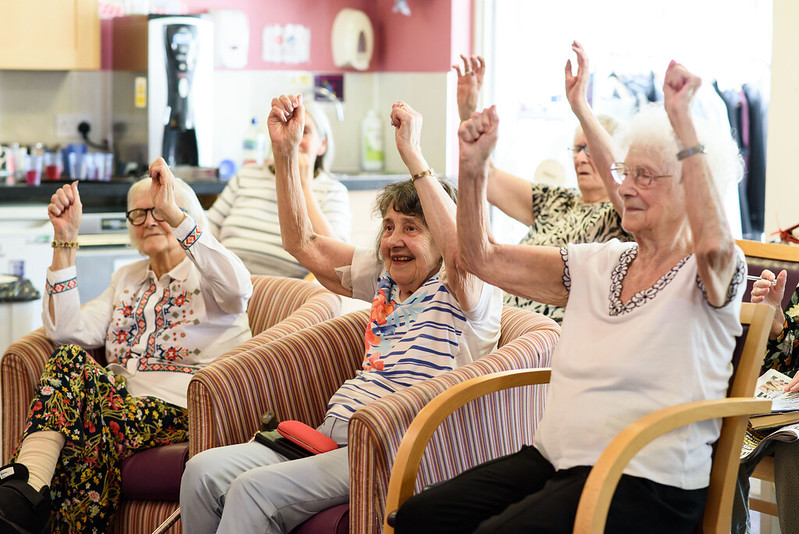“We have seen many impacts on residents including increased self-confidence, new friendships, improved eating and drinking, laughter and improved speech.”
Shona Bradbury, Manager, Appleby House Care UK
This case study looks at the impact of the Live Music in Care programme on ApplebyHouse CareUK, a residential home specialising in providing care for people living with Dementia.
Oboist Will Ball and clarinettist Craig McLaren of Live Music Now’s Coriolis Quintet led an 11-week Live Music in Care initiative at Appleby House in the spring/summer of 2022, funded by the City Bridge Trust and Rayne Foundation.
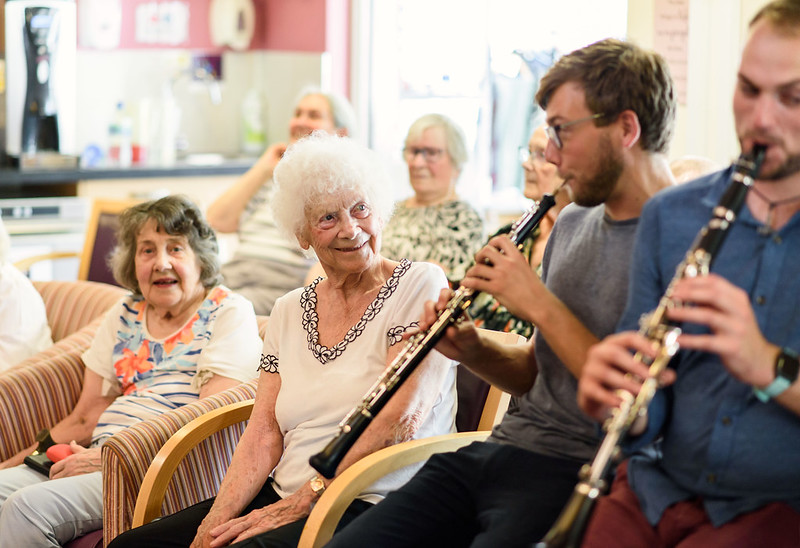
“It was amazing to see residents who are normally non-responsive or disengaged involve themselves fully in the activities presented to them – the staff found themselves very emotional at times as a result.”
Craig McLaren, Live Music Now Musician
What we did
Live Music in Care aims to expand the provision of regular musical activities in residential care facilities. Celebrating music together encourages care staff and residents to find a shared interest and supports care givers to recognise creativity and its value in care.
Working closely with Home Manager Shona Bradbury, the Live Music Now musicians identified four members of staff to participate in this project.
Staff and musicians took part in an online training session hosted by Live Music Now alumnus David Jones to establish goals and expectations and learn how to maximise participation.
The musicians initially visited the home for a planning session, after which they gave an introductory concert to the residents. Then, each week for the next ten weeks, Will and Craig led a 45min interactive music workshop with the residents.
Staff were encouraged and supported to take an active involvement in the delivery of the workshops with time set aside before and after each session for musicians and staff to plan and reflect. Will and Craig worked to support the goals of the lifestyles team moving towards harmonising their singing and learning new songs. Giving the team self-confidence has been a major focus of this effort, including coaching them on how to warm up and harmonise.
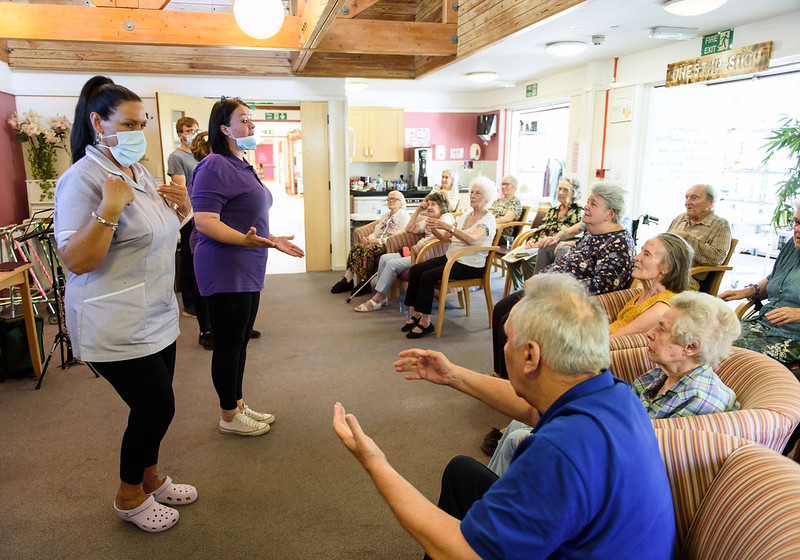
To test out the new approaches and embed what they had learned, staff members were required to lead their own music sessions with residents in between each visit. David Jones visited Appleby House twice during the ten weeks to observe the musician-led sessions and to provide them with support and guidance. He observed how the staff team had progressed, including incorporating elements of singing in harmony into their regular singing sessions and teaching the residents a new song “History” by One Direction Everyone was delighted when Will and Craig recorded them singing this. The mentor was impressed with the focus and commitment of the lifestyle team, and their growing excitement and confidence.
When granted a budget at the end of the project to purchase resources and equipment to support the home’s ongoing musical life, the staff decided to purchase a potable PA and microphone for the choir, who would like to record their signing and hear it again.
Summary Impact on Residents, Team and Home
For the Home, residents, and staff, participating in the Live Music in Care programme has increased the importance and regularity and effectiveness of live music activities.
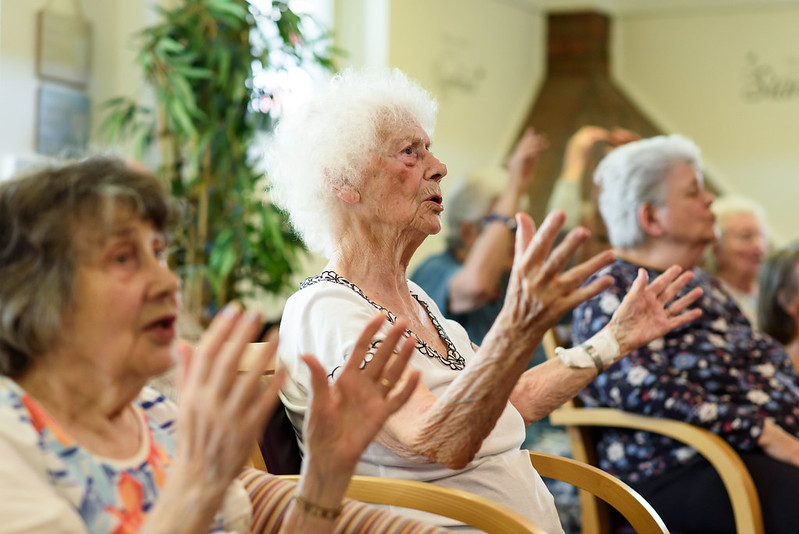
Live music has had a positive effect on residents living with dementia, impacting on, moral, engagement and interactions with other residents, families, and staff members.
One resident was noted to have an improvement in diet and fluid intake, while another received encouragement and grew more self-assured as she learned how to navigate the home. A couple evolved from being extremely unhappy about relocating to a care home to taking the lead in recruiting other residents to participate in the music.
Residents are becoming more assertive requesting music activities, speaking up for the music they want and exerting influence over the staff to use music to improve general wellbeing.
‘Employers with favourable workforce metrics (such as high levels of learning and development), on average, had better outcomes (lower staff turnover and/or high CQC ratings).’
Live Music Now will continue to work with teams and residents at Appleby House on their ambition to increase the skills and confidence of team members across the setting to use music and singing as part of their daily interaction with and support for residents. After the residency, there are now music related activities four times a week, up from once a week before.
Statements
Shona Bradbury Manager
We have loved having Will and Craig visiting us and will miss them greatly. We have always believed in the power of music and pre -Covid had a choir in the home. Working with Live Music Now has helped us to re-establish our choir and put music high on our agenda. It has gone from strength to strength. Before the choir met once a week, now the choir demand singing takes place 4 days a week with 20 people attending.
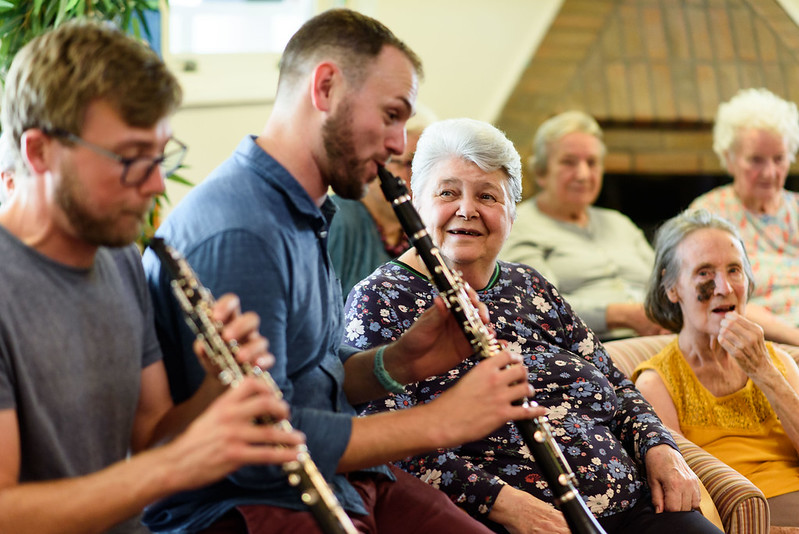
We have seen many impacts on residents including increased self-confidence, new friendships, improved eating and drinking, laughter and improved speech.
We had a new resident who has changed dramatically; her son tells us she was always sociable, but quiet. Not anymore, this resident is now very vocal and confident. The same new resident was observed helping another resident to read the words to a song.
During music sessions, the residents and staff taking part are united in one goal, singing; this has no barriers. The dementia experience means that some residents will not remember they were singing, but the sessions continue in the day to elevate their moods.
There has been a huge shift; with staff understanding how to lead the exercises and guide the music. I find it amazing that the residents are speaking up now with such a positive attitude and assurance about what they want and need.
One couple that came in were angry about coming to live here, but now she is one of the main characters taking a lead helping other members of the choir. She has spoken to other residents about getting involved including persuading those who lives on her floor.
A resident who arrived emaciated and reluctant to eat or drink has been transformed though participation, now eating and drinking and eagerly involved in the music.
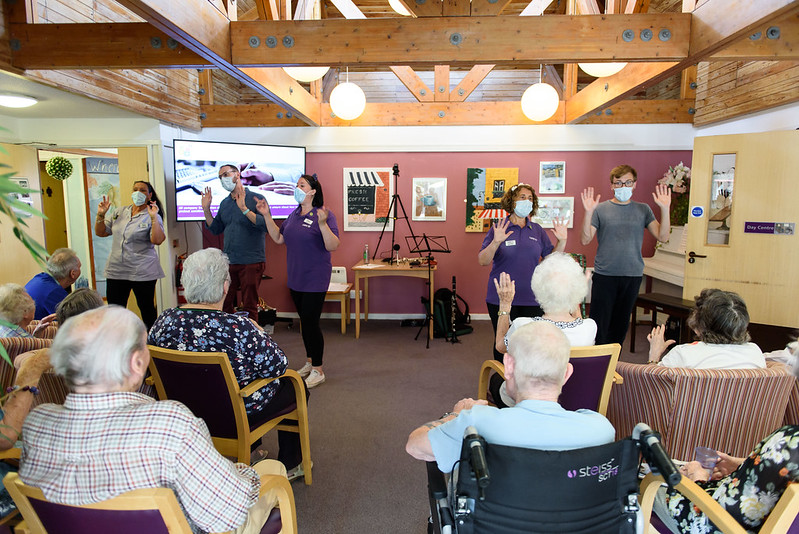
Margaret, who lives with advanced dementia and does not communicate, is now not only singing, but actively participates in movements and actions when singing. Honestly, I cannot tell you how shocked and mesmerized I was to see how engaged this lady was. It absolutely floored me. You wouldn’t believe it’s the same person. In fact, she did it in time to everything and she knew, but she never vocalizes and speaks, and she’s singing along. I know we’ve seen this in other cases before, but this was just quite something. I think there’s something about her being part of a community, united in something, in this extra little family, united in doing the same thing. So somewhere in her, she feels that she’s not alone, that she’s doing something? In the moment her dementia has no obvious effect she is just a person, part of the choir, and that’s really powerful.
With dementia, the journey is what matters most, not the destination. When you hear them sing and watch them come out joyfully, and when visitors and others who visit the home hear the music, it astounds them on so many levels. The residents want to go there, they enjoy it, and we can see positive results both during and after the sessions.
We got on so well with Will and Craig they encouraged the team to take it further, beyond our Lifestyles Team, with carers and other staff. Whatever your role job you feel uplifted, and it strengthens relationships. We are empowering our staff with and through the use of music.
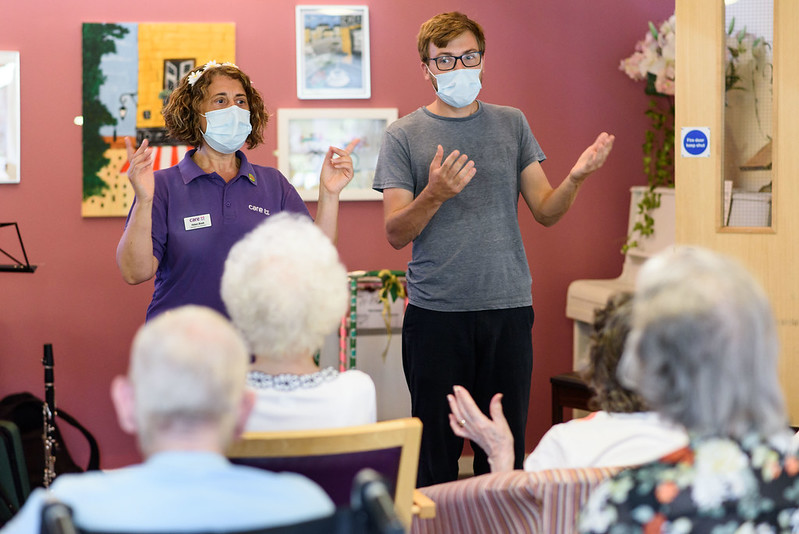
Tracey Judd Lead Lifestyle Coordinator
It’s about being part of a community, valued in something, not alone but part of the choir.
There are now four people who stand up and take solo parts. Their confidence has got so great that they will actually stand up in the front of the choir and lead them in song; and that is going from being somebody that was very, very shy to someone standing up and leading.
Will and Craig were amazing. We got on so, so well. We were able to bounce off them and have a giggle with the residents. They truly were missing them when they weren’t here. But it has really empowered my team to take that further, to think out of the box more in bringing in new music for them to be able to sing.
Repetition is part of that; using the vocal warmups and hello songs to start the session has really helped the residents to focus and let them know when the session begins, with the ending songs letting them know when the session has ended. This has helped to structure the sessions. Using these skills in our choir practices has really helped the residents and they focus more and are able to follow instructions better.
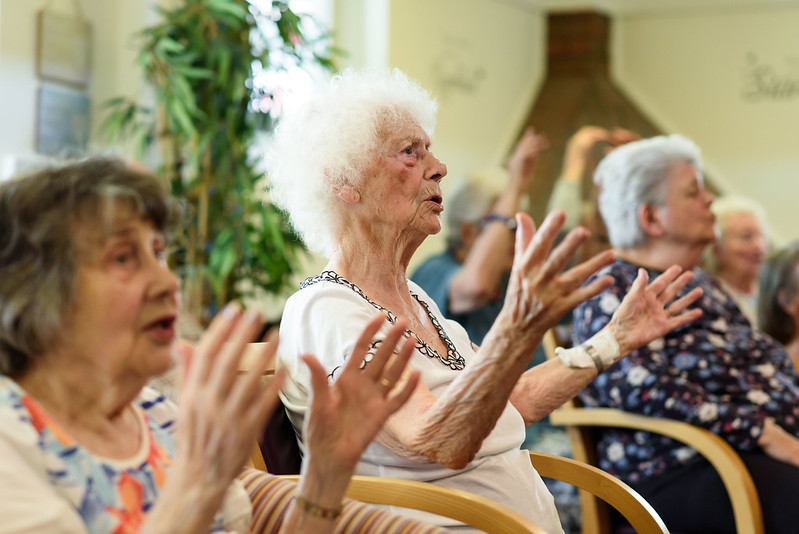
This also helps with orientation. A lady wouldn’t leave the lounge as she was worried, she would not know the way back. Now she has the confidence to go to new places in the home and has become a leader. She tells people where they need to be.
The residents have really connected with others and built some lovely friendships. Being part of the choir and music residency has made such an impact for people to really connect. They have grown in confidence, and they do not just say and do what they are told, which is wonderful.
I had to go and speak to a lady in the evening, who suffers with anxiety. She’s been with us about three years now. She’s joined the choir. She’s got some recall. She knows I’m somebody that she comes to if she’s got any worries. We talked about the choir and when I said how lovely it was to see her there, her smile. She’s never going to be very vocal, but she’s coming back and she’s enjoying it, and she’s coming each time. That in itself, for our residents here, everyone lives with a dementia, to be happy to want to leave their safe area and go somewhere to sit with a group of other people, speaks volumes.
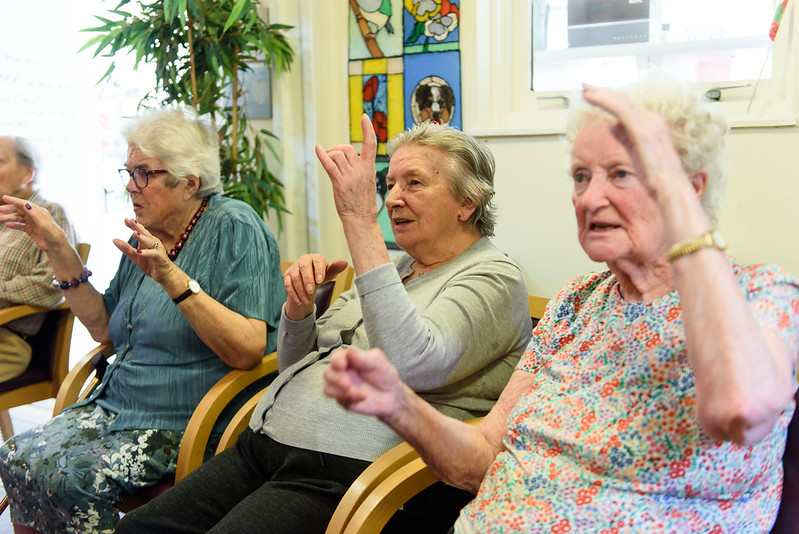
One resident, EE, reduced me to tears this lady did not join in. We tried to encourage her in and ‘no, no, no, no,’ nothing. She used to sit in the hallway . We left the doors open and the choir began to sing, and they started to sing Edelweiss, this lady got up. I watched her, she walked in, I offered her the seat in the front row, which was spare. She sat down, and she sang Edelweiss, word for word, it reduced me to tears because I’ve never seen her do that. It just completely blew me away.
We have a resident that is very anxious. She will call out. I was with a particular carer, and she would call out and I’d say, “I’ve got you. I’ve got you.” She was anxious. I started to sing the song, “I’ve got you, babe. I’ve got…” And she stopped what she was doing and sang with me, her anxiety just lifted. The carer was like, “Wow, how did you do that?” “Music, just go with it, whatever she calls out, make a song of it, she will sing with you.” It helps me to empower other staff to use music in reducing anxiety levels in residents in our care.
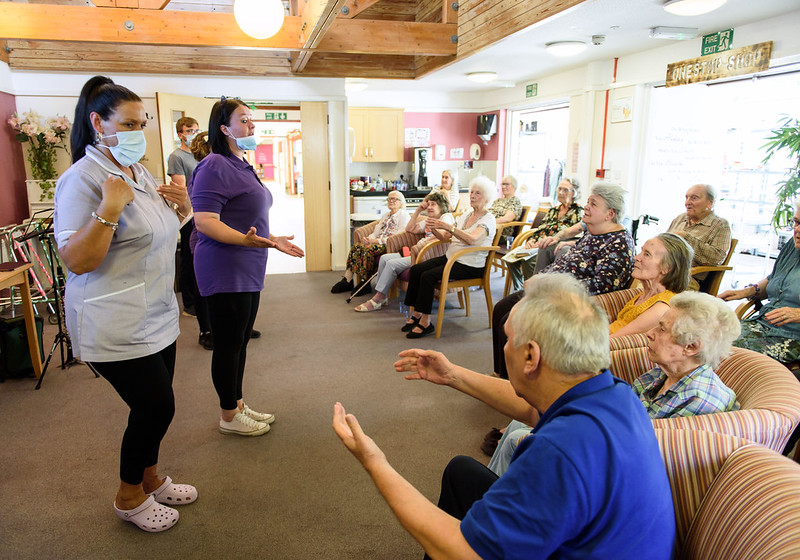
Will and Craig have been absolutely amazing they have made real connections with residents and staff during the sessions. We have learnt so much from them on how to structure the session better. It has been an amazing journey watching the residents transform in confidence
It’s really empowered our team too; we are excited when we put on these things. For residents to come to me and say, “Well, actually I know we have choir practice three times a week, but I’d like to do it four” and that’s not just one resident its five or six. So, we’ve said, “Right, okay, let’s put on four” it really makes my day to be able to sing with the choir.
It’s so encouraging them telling us and giving us pointers of what they want it’s just been an incredible journey. I’m so honoured to be a part of it and to continue to watch its growth.

